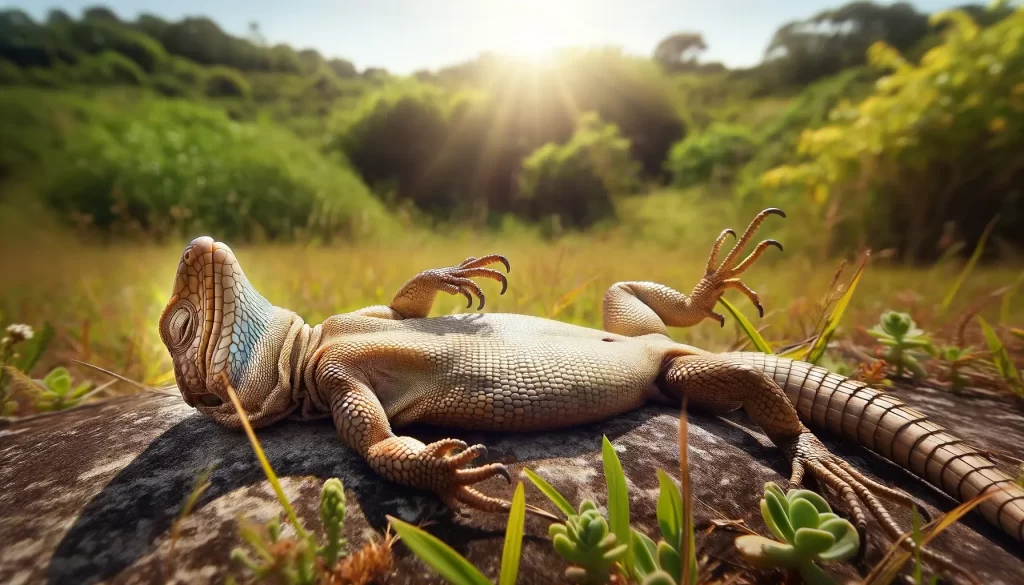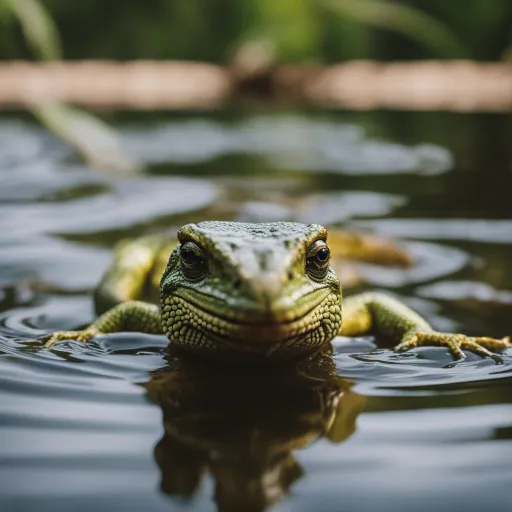Have you ever been in a situation where you needed to stay still and silent, hoping that danger would pass you by?
Perhaps it was a childhood game of hide-and-seek, or maybe you found yourself frozen in fear during a real-life encounter.
In those moments, our instincts kick in, urging us to become as inconspicuous as possible, to blend into the background and escape unnoticed.
It is a survival strategy deeply ingrained in us, and surprisingly, we are not alone in employing it.
Lizards play dead as a defense mechanism, known as Thanatosis, to avoid predation. By appearing dead, they become less appealing to predators that prefer live prey, increasing their chances of survival when threatened.
When confronted by predators, these reptiles have the remarkable ability to mimic lifelessness, tricking their assailants into believing that they are nothing more than a lifeless carcass.
It is a strategy that has been honed over generations, enabling lizards to outwit their would-be captors and ensure their own survival.
Key Takeaways:
- Lizards have a survival strategy called thanatosis, where they play dead to evade predators.
- Playing dead allows lizards to conserve energy and avoid conflict.
- There is a scientific basis for this behavior, involving physiological responses and cognitive aspects.
- Thanatosis has evolved as an adaptive advantage through natural selection.
- Observing thanatosis in captivity provides valuable insights for reptile keepers.
The Phenomenon of Playing Dead in Lizards
Playing dead, also known as thanatosis, is a fascinating behavior exhibited by some lizard species as a defense mechanism.
When a lizard plays dead, it goes to great lengths to mimic a lifeless carcass, fooling potential predators into thinking it is no longer a threat.
Understanding Thanatosis
Thanatosis is a unique lizard behavior where the animal lies on its back, closes its eyes, and hangs its tongue out, resembling a motionless and deceased creature.
This deceptive strategy allows lizards to evade predators and increase their chances of survival.
Examples of Lizard Species That Play Dead:
- ✅ Eastern Collared Lizard
- ✅ California Legless Lizard
- ✅ Texas Horned Lizard
- ✅ Sagebrush Lizard
Examples of Lizard Species That Play Dead
Several lizard species have evolved the ability to play dead as a defensive mechanism. Here are a few examples:
- Eastern Collared Lizard
- California Legless Lizard
- Texas Horned Lizard
- Sagebrush Lizard
Why Lizards Play Dead: The Survival Benefits
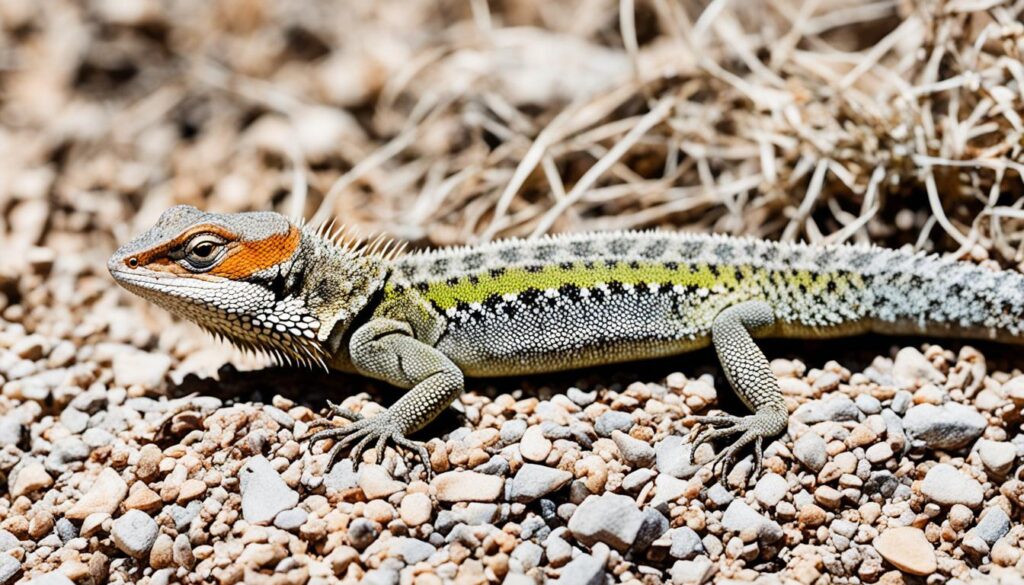
Playing dead is a defensive strategy that provides lizards with valuable survival benefits.
By appearing lifeless, lizards can evade predators and minimize the risk of aggression, allowing them to increase their chances of survival in their natural habitats.
Evasion of Predators
One of the primary reasons why lizards play dead is to evade predators. When confronted with a potential threat, lizards will instinctively perform thanatosis, a behavior in which they mimic the appearance of a lifeless carcass.
By doing so, they hope to deceive predators and create the impression that they are no longer viable prey.
This defensive strategy is particularly advantageous for lizards because it can trick predators into losing interest and moving on to easier targets.
By playing dead, lizards buy precious time to escape or seek refuge, ultimately improving their chances of survival.
Avoiding Conflict
Another survival benefit of playing dead is the ability to avoid conflict. When lizards submit to a predator by playing dead, they communicate that they pose no threat. By assuming a submissive posture, lizards reduce the risk of aggression and confrontation with potential predators.
This avoidance of conflict is crucial for lizards, as engaging in physical battles with predators can be dangerous and energy-consuming.
By choosing to play dead instead, lizards conserve energy and minimize the risk of sustaining injuries or attracting further attention from predators.
Overall, the survival benefits of playing dead in lizards are clear. This defensive strategy allows them to evade predators and avoid potentially harmful conflicts.
By understanding the reasons behind this behavior, we gain valuable insights into the fascinating world of lizard behavior and their remarkable defensive strategies.
The Science Behind Playing Dead
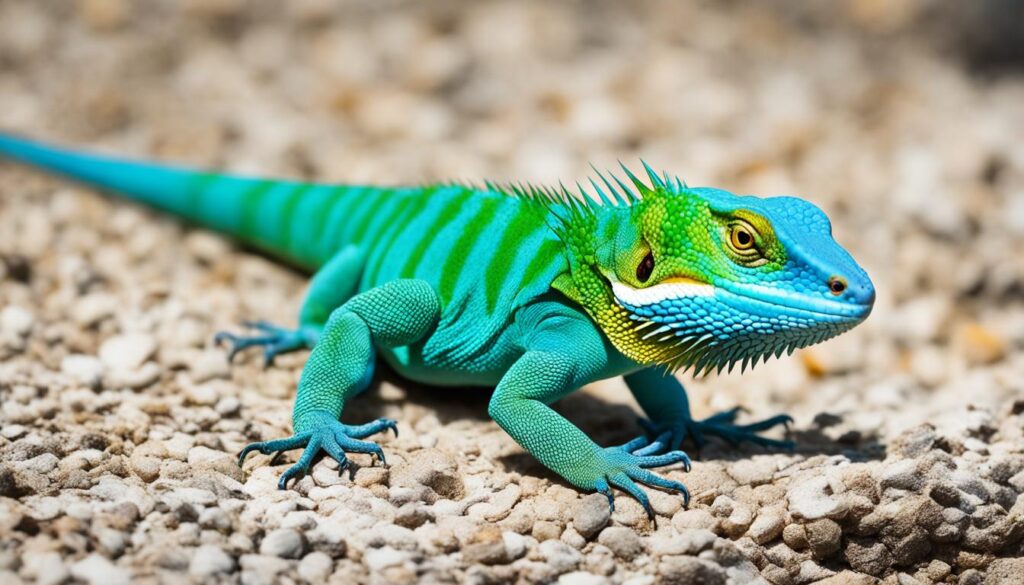
When it comes to lizards playing dead, there is a fascinating science behind this behavior. Let’s explore the physiological responses and cognitive aspects that contribute to this instinctual behavior.
Physiological Responses
Playing dead triggers a series of physiological responses in lizards. One of the most noticeable changes is a drop in heart rate and respiration.
By slowing down these vital functions, lizards are able to conserve energy and reduce their chances of being detected by predators.
This response allows them to stay motionless and appear lifeless, further enhancing their chances of survival.
Cognitive and Instinctual Aspects
Playing dead also involves cognitive and instinctual behavior in lizards. When faced with a potential threat, lizards quickly assess the level of danger and respond accordingly.
Through experience and observation, they are able to gauge the appropriate moment to play dead, determining if it is the best course of action to escape the predator’s attention.
This cognitive ability combined with their instinctual nature allows lizards to adapt their behavior to their specific circumstances.
Understanding the science behind playing dead in lizards provides us with insights into the strategies they employ to survive in their environments.
These physiological responses and cognitive aspects showcase the incredible adaptability and complexity of these reptiles.
Evolutionary Perspectives on Thanatosis
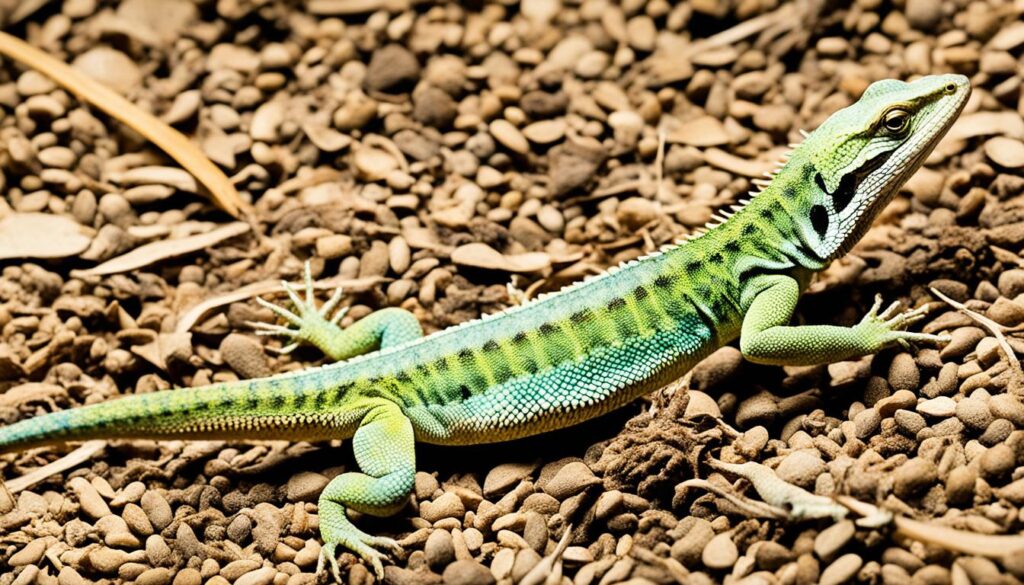
Thanatosis, the behavior of playing dead exhibited by some lizard species, has evolved as an adaptive advantage to increase their chances of survival.
By mimicking a lifeless carcass, lizards reduce the risk of being eaten by predators, thereby improving their ability to pass on their genes through natural selection.
Predator-prey dynamics play a crucial role in shaping the evolution of thanatosis as a survival strategy.
When lizards play dead, they exploit the confusion and hesitation it causes in predators.
This defensive behavior allows lizards to gain an upper hand in the predator-prey relationship, increasing their chances of survival and successful reproduction.
Additionally, playing dead provides lizards with adaptive advantages that contribute to their overall fitness.
By avoiding confrontation with predators, lizards conserve energy that can be allocated to other essential activities such as foraging, reproduction, and maintaining bodily functions.
Overall, the evolutionary perspectives on thanatosis highlight its significance as a strategic adaptation for lizards in predator-rich environments.
This behavior showcases the intricate interplay between natural selection, predator-prey dynamics, and the survival strategies employed by different species in response to their unique ecological contexts.
Observing Thanatosis in Captivity
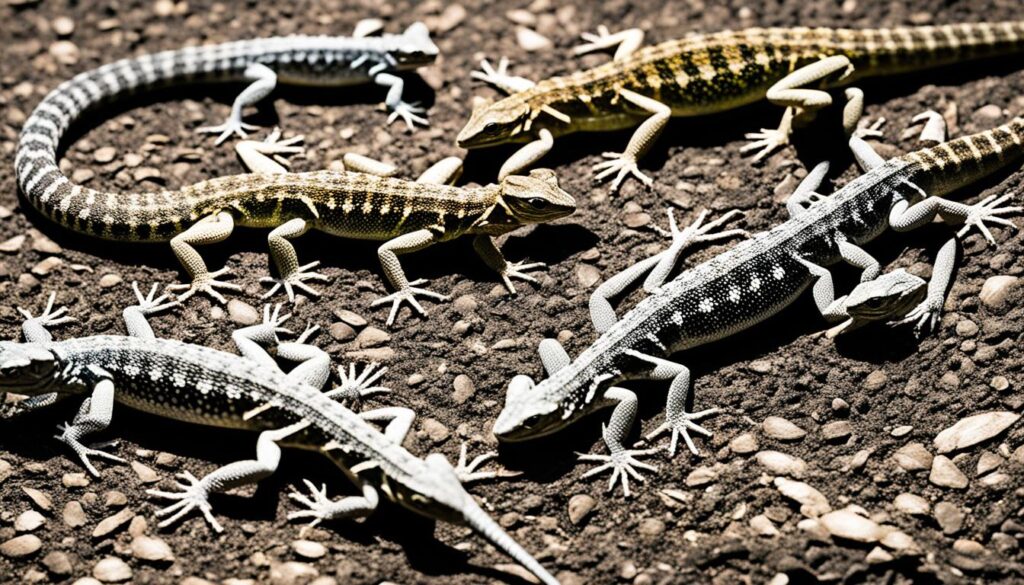
When it comes to understanding the behavior and needs of captive lizards, observing thanatosis can provide valuable insights for reptile keepers.
By witnessing this unique defense mechanism in action, we can gain a better understanding of how lizards behave in their natural habitats and effectively cater to their needs.
Creating environments that encourage natural behaviors, including thanatosis, is essential for the well-being of captive lizards.
By providing suitable hiding spots, appropriate temperature gradients, and proper substrates, reptile keepers can ensure that their pets feel secure and able to exhibit their instinctual behaviors.
Research and studies conducted in captive environments also contribute to our understanding of thanatosis and its implications for lizard welfare.
Through careful observation and analysis, scientists can gather valuable data on how lizards initiate and respond to thanatosis, further enriching our knowledge of this intriguing phenomenon.
Conservation and Ethical Considerations
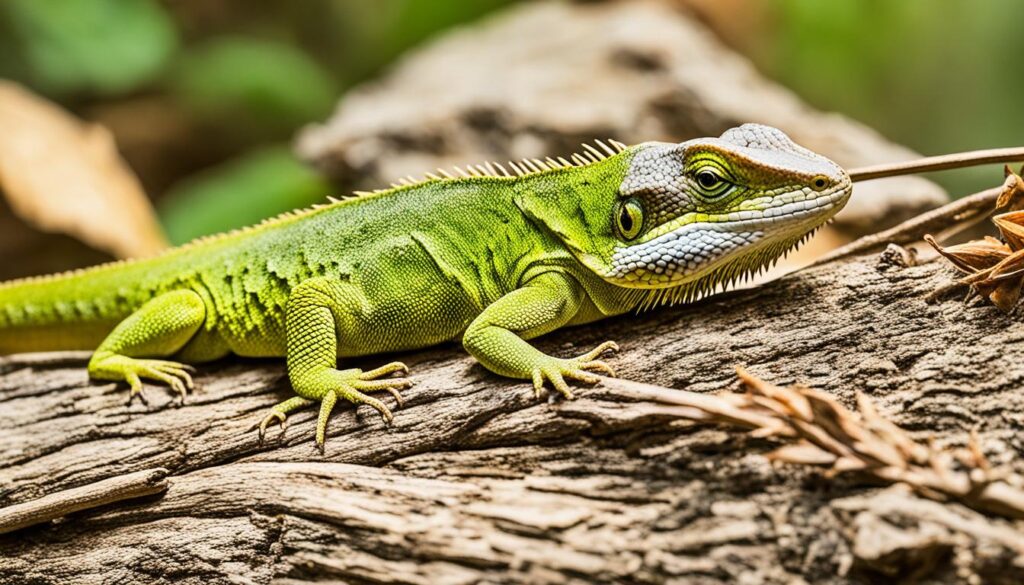
The conservation of lizard populations is crucial and should consider their natural behaviors, including thanatosis.
Understanding the impact of human activities on lizard populations and their ability to perform thanatosis is essential for conservation efforts.
It is important to recognize that our actions can have a significant impact on these populations and their survival strategies.
Ethical considerations should also be taken into account when interacting with lizards in the wild. Respecting their natural behaviors and habitats is essential for their well-being.
It is our responsibility to ensure that our interactions with wildlife are conducted in an ethical manner that minimizes disturbance and respects the ecological balance.
By prioritizing conservation and ethical wildlife interaction, we can contribute to the preservation of lizard populations and their natural behaviors.
By understanding their unique survival strategies and the impact of our actions, we can work towards a more sustainable future for these remarkable creatures.
Conclusion
Playing dead is a fascinating survival strategy exhibited by some lizard species. Lizards have developed the ability to play dead in order to evade predators, avoid conflict, and conserve energy.
This adaptive behavior involves a range of physiological responses and cognitive and instinctual aspects.
Through natural selection, thanatosis has evolved as an advantageous strategy for lizards to increase their chances of survival.
By appearing lifeless, lizards can reduce the risk of being eaten by predators and improve their chances of passing on their genes.
Observing thanatosis in captivity can provide valuable insights for reptile keepers, helping them create environments that support natural behaviors and ensure the well-being of their pets.
Conservation efforts should take into account the impact on lizard populations and promote ethical wildlife interaction, respecting the natural behaviors and habitats of these remarkable creatures.
Understanding why lizards play dead contributes to our knowledge of their behavior and adaptive strategies.
It highlights the remarkable complexity and ingenuity of nature’s survival mechanisms. Lizards have developed an incredible ability to trick predators and increase their chances of survival in challenging environments.
Playing dead is not only a matter of survival for lizards, but also a testament to the incredible diversity and adaptability of life on Earth.
Frequently Asked Questions
Q: How long do lizards play dead?
A: The duration can vary depending on the species and the situation, but lizards can play dead for a few minutes up to an hour to avoid predation.
Q: Why do lizards play dead when they die?
A: Lizards play dead (thanatosis) not when they die, but as a defense mechanism to make predators lose interest, as many predators prefer live prey.
Q: How do you tell if a lizard is playing dead?
A: A lizard playing dead will be very still, often with an open mouth or an unnatural pose. They won’t react to gentle stimuli but may blink or breathe shallowly.
Q: Do baby lizards play dead?
A: Yes, baby lizards can play dead as a survival tactic, instinctively using this behavior to protect themselves from threats.
Q: Do baby lizards play dead in the wild?
A: Yes, baby lizards in the wild use this defense mechanism to evade predators, especially when other escape routes are not available.
Q: Do geckos play dead?
A: Yes, geckos, like many other lizard species, can play dead when they feel threatened or are in danger, to avoid attracting attention from predators.
Q: Do lizards play dead when they are scared?
A: Yes, playing dead is a common response among lizards when they are scared or perceive a significant threat, serving as a defense mechanism to avoid predation.


